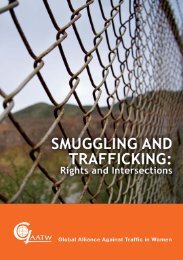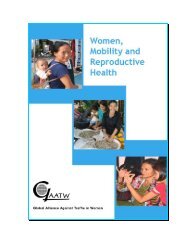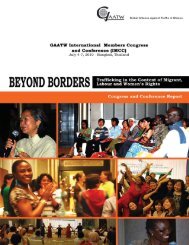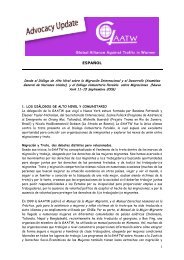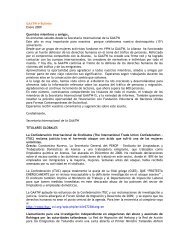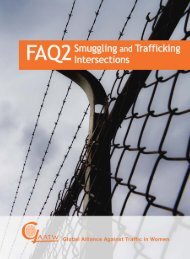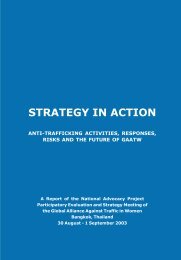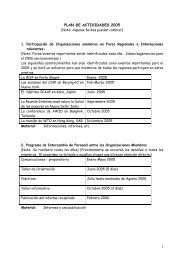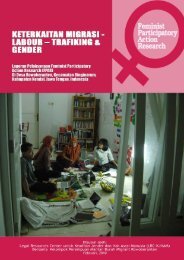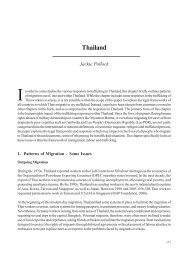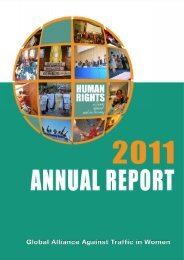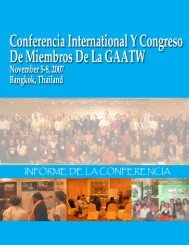Exploring Links between Trafficking and Migration - Global Alliance ...
Exploring Links between Trafficking and Migration - Global Alliance ...
Exploring Links between Trafficking and Migration - Global Alliance ...
- No tags were found...
Create successful ePaper yourself
Turn your PDF publications into a flip-book with our unique Google optimized e-Paper software.
<strong>Exploring</strong> <strong>Links</strong> <strong>between</strong> <strong>Trafficking</strong> <strong>and</strong> <strong>Migration</strong>Not “Kenyan enough”: Discrimination against Somali groups in Kenya 54External migrant women (particularly if they are from Somalia) bear thebrunt of hardship <strong>and</strong> prejudice not only because of poverty <strong>and</strong> genderbias but also because of the xenophobic <strong>and</strong> discriminative attitudes towardsthem from the general Kenyan public. The fact that there is a Somali ethnicgroup in Kenya, which shares customs <strong>and</strong> a language with Somalis in Somaliais worth mentioning. Kenyan Somalis have for a long time been marginalised<strong>and</strong> are often perceived as not being “Kenyan enough”. Some Kenyan-Somali residents in Kiamaiko, a Nairobi slum, for instance, point to theharassment meted out by law enforcement officials who accuse them ofbeing urban refugees <strong>and</strong> refuse to acknowledge their national identitycards as real.Somali <strong>and</strong> Ethiopian migrants in Kiamaiko state that their Kenyan neighbourslook down upon them <strong>and</strong> often refer to them as “refugees” <strong>and</strong> “wariah”37,regardless of whether they have Kenyan citizenship or not. There aredifferences in the amount of rent the migrants pay: where Kenyans arecharged KShs 1,000 ($14) per month, some migrants are charged KShs3,000 ($42). One woman recount that her family was kicked out of theirhouse without any prior warning <strong>and</strong> they could not take this up with theauthorities because they do not have national identity cards.Getting assistance from law enforcement officers is very difficult asgovernment officials also take part in mistreating migrants. Oftentimesmigrants in Kiamaiko have to bribe law enforcement officials to get servicesor to avoid harassment. It is difficult for migrant women in Kiamaiko toaccess justice for themselves <strong>and</strong> their children in cases of abuse becauseof this discrimination by officials.LINKAGES IN ADVOCACY AND GETTINGADVOCATES TOGETHERSpecialisation in Advocacy <strong>and</strong> LawThe anti-trafficking field has built up very specific language in international,national <strong>and</strong> local law worldwide. Definitions have become detailed.Legislation <strong>and</strong> implementation have become complicated.When we do advocacy work aimed at governments changing or betteringtheir anti-trafficking laws or when we take a trafficking case to court, wehave to maintain the separation <strong>between</strong> trafficking <strong>and</strong> migration as distinctconcepts. By doing this, we speak with precise legal language that gives uscredibility <strong>and</strong> makes our case stronger. It can create confusion whentrafficked <strong>and</strong> migrant women are merged or talked about together.Specialisation to Maintain Gains made for TraffickedPersonsWe have made many gains over the years to protect the rights of traffickedpersons. For instance, in some countries if trafficked persons want it, anti-19



